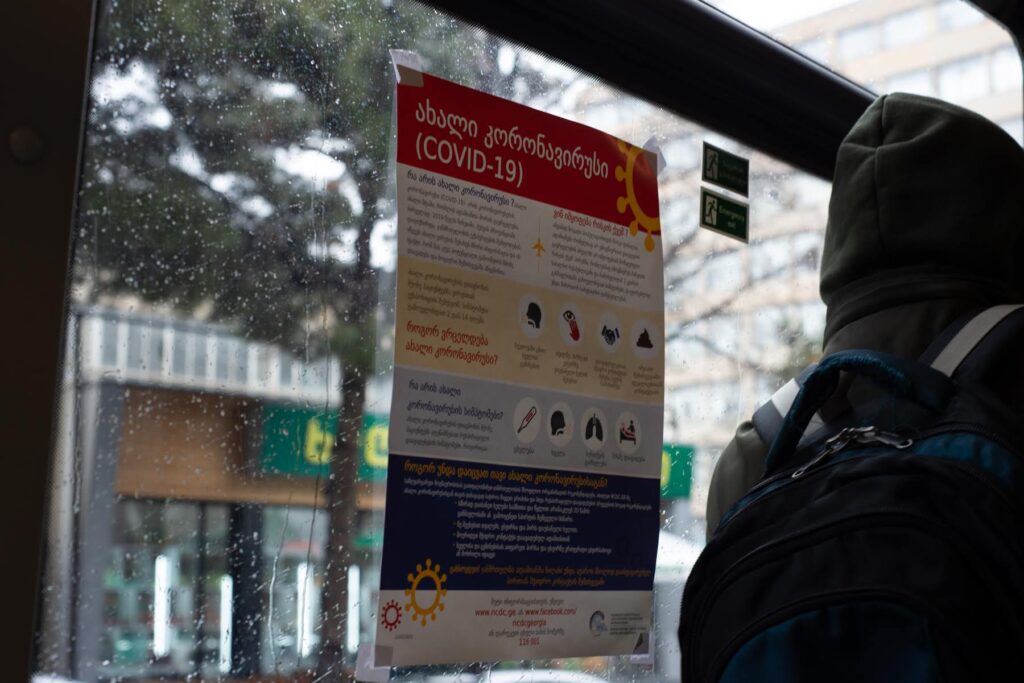Georgian President Salome Zurabishvili has declared a state of emergency across the country to help prevent the spread of the coronavirus.
‘I have made the decision to declare a state of emergency across the whole territory of Georgia. The decision comes to force immediately’, Zurabishvili said.
‘I will also issue a decree restricting rights guaranteed by the constitution, including freedom of movement, freedom of assembly, and access to public services.’
Parliament must now vote on whether to approve the state of emergency within 48 hours; if a majority votes against the measure, it will be immediately revoked.
The measures are set to last until at least 21 April, after which parliament will have to approve any extension.
[Read live updates on the coronavirus in the Caucasus]
Davit Bakradze, one of the leaders of the opposition European Georgia Party, said they would vote in favour of the measure.
The party has been boycotting parliament in protest against a government U-turn on electoral reforms, however, Bakradze said they would make an exception to attend the vote.
Speaking prior to the president’s announcement, Prime Minister Giorgi Gakharia said he had requested the president take the move.
‘We are switching to the next stage of the spread of the virus — the stage of domestic spread — which requires special measures both from government and the people’, Prime Minister Giorgi Gakharia said.
‘Our major goal has to be to stop a massive spread of the virus and to slow down the speed of the spread.’
Gakharia announced that the measure would include a number of new restrictions.
Gatherings of 10 or more people will be prohibited. Asked if this would include churchgoers, the Prime Minister said it would include ‘everything and everyone’.
The Government will have the right to appropriate private property when needed for medical reasons.
The Government will have the right to restrict the activities of private organisations and businesses or to isntruct them to conduct specific activities.
If needed, the government will impose price regulations on medicine and medical services.
People will be forcibly quarantined if they break the rules, and other sanctions will also be imposed.
Special rules will also be introduced in supermarkets. Shops will be obliged to prevent more than 10 people from standing together in a closed environment.
‘We should look at best practices such as in Europe, where people keep a safe distance of up to 2 metres between each other. This is the matter of our citizens’ ability to self-organise and business responsibility.’
Air and land travel to Georgia will continue to be closed except for freight transportation.
Court hearings may begin to be held remotely.
Gakharia said there would be no restrictions on the media. He said limits on freedom of movement were already in place but that no curfew would be announced yet.
Anyone caught violating the state of emergency could face fines of up to ₾3,000 for individual or ₾15,000 for companies or organisations. Repeat offenders could face up to three years in prison.
A response to the Church
The Human Rights Education and Monitoring Centre (EMC), a local rights group, have said they believe the declaration of a state of emergency in Georgia was a response to the Georgian Orthodox Church.
Yesterday, the Church’s ruling body, the Holy Synod, decided not to change the practice of using a common spoon for Holy Communion despite warnings from health officials that it could spread the coronavirus.
In their statement, EMC said the Holy Synod’s decision put the public’s health at risk and openly contradicted public order.
They also criticised the Church for lacking ‘solidarity’.
‘The decision of the Holy Synod lacked solidarity. Among other things, it failed to mention the needs of groups doing even worse because of the current situation, such as homeless people, workers, the elderly, people with disabilities, unemployed people, and tens of thousands of those left without a minimum income.’
The group said the Holy Synod’s decision put the Church in open competition with the state and was a bid to strengthen its own power.
EMC called on the government to negotiate with the Church authorities to prevent willful gatherings and resistance to state restrictions on religious motives.
It also called on religious figures to follow restrictions put in place and to prevent gatherings in churches in a bid to save the lives and the health of their followers and others.
What is a state of emergency?
According to Georgia’s constitution, a state of emergency grants the president — with the agreement of the prime minister — the right to issue decrees restricting a number of constitutional civil rights.
These include the rights to liberty, freedom of movement, privacy and private communication, free media, public information, and private property.
The president, with the agreement of the prime minister, will also have the power to enact new laws by decree.
The president’s decrees will come into force immediately on being issued, but must then be submitted to parliament for approval within 48 hours.
During an epidemic, a state of emergency also grants the prime minister the power to deploy the armed forces without the approval of parliament.
Parliament may revoke the state of emergency at any time, at which point all decrees issued during this time will also be revoked.




 21 March 2020
21 March 2020



